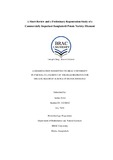A short review and a preliminary regeneration study of a commercially important Bangladeshi potato variety: Diamant
Abstract
Potato is one of the most important solanaceous tuber crops occupying the fourth position
worldwide among all the food crops. Despite not being native to our country, potato
production is growing in last few decades. Potato is important to tackle nutritional
security as it is a very good source of many essential vitamins, minerals and also,
carbohydrate. But with the climate change, salt water intrusion to inland soil and loss of
cultivable land, development of high yielding variety of potato with salt tolerance is
imperative. Moreover, pathogen infestation is also a problem in production. For this
reason, it is essential to increase cultivation and yield of potato in Bangladesh. Plant
biotechnology is a good option for improvement. But before proceeding to that, an
efficient and reliable protocol for in vitro regeneration is necessary. For this, an extensive
study of the existing in vitro protocols was performed here. In light of that, later, nodal
explants from a high yielding farmer popular variety, Diamant, was evaluated for
regeneration capacity. In terms of shooting response (92.08%), highest shoot length
(11.38cm), highest rooting response (98.02%), maximum root length (15.68cm) and
survivability percentage after acclimatization in nature (96%), hormone free MS media
gave the best response. With increase in concentrations of cytokinins, early shoot
initiation occurred but shoots became stunted. However, low concentration of Kn was
seen to be favourable in terms of multiple shooting. After acclimatization in nature,
highest (96%) percentage of plantlets survived that were cultured in hormone free MS
media.

